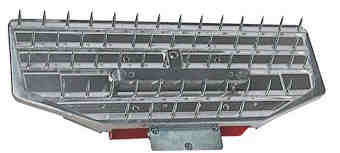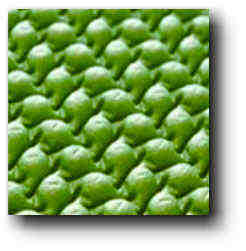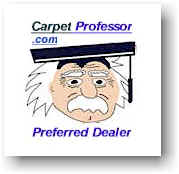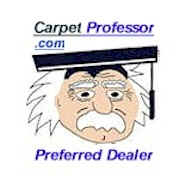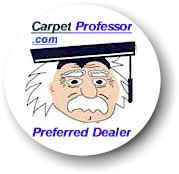How To Choose New Flooring Like A Pro!
List of Preferred Local Flooring Stores
(Free Information by Consumer Advocate - No Flooring Sales)
Waterproof Carpet Padding Explained
Moisture Barrier Pad, Rubber Pad, Water-Resistant, Best Pad for Basements?
What is Moisture Barrier Padding?
Moisture Barrier padding is a special carpet padding that has a layer of plastic on the top to help prevent liquids from soaking through the carpet backing and into the padding and to the subfloor. One pad maker says on their website "a moisture barrier helps prevent spills and accidents from penetrating the cushion, so they can be blotted from the carpet quickly and easily." However this statement does not make sense to me. Once a spill goes through the carpet backing and spreads out on the top of the padding, how can it be blotted up?
Is Moisture-Barrier Padding Necessary?
Some carpet salespeople recommend a Moisture Barrier Padding or some other type of padding upgrade to almost every customer. Moisture Barrier Padding is more costly than a standard Rebond padding. Upgrading to any specialty padding, including pad with a moisture barrier, can cost you plenty. If you upgrade from a standard 6-pound density Rebond pad to an 8-pound density moisture-barrier pad, it can easily double your padding cost. Do you really need to upgrade your padding? In most cases no. however, I find that many homeowners are easily mislead into thinking that a Moisture Barrier Padding can solve their pet urine problems.
Here is what I mean...
They say that a Moisture-Barrier Pad will prevent spills from soaking through the pad. While this is true, what benefit does that provide? Any amount of liquid that is spilled and soaks through the carpet will quickly spread out on top of a moisture barrier pad. Some say that if the padding seams are sealed with duct tape, that liquids will not be able to soak through. Don't count on that, because moisture barrier pad is not waterproof.
In a Perfect World...
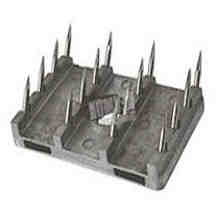 Have
you ever seen the sharp teeth on a carpet knee kicker? It's a hand / knee tool used
to help stretch-in the carpet. It is used all
around the perimeter of every room. What do you suppose those 16 razor
sharp spears will do to the thin layer of plastic on the top of the Moisture
Barrier Pad? The moisture barrier padding is not going to be water-proof with
all these holes in it.
Have
you ever seen the sharp teeth on a carpet knee kicker? It's a hand / knee tool used
to help stretch-in the carpet. It is used all
around the perimeter of every room. What do you suppose those 16 razor
sharp spears will do to the thin layer of plastic on the top of the Moisture
Barrier Pad? The moisture barrier padding is not going to be water-proof with
all these holes in it.
Then there's the Carpet Power Stretcher, a serious tool required to properly install any stretch-in carpet over pad. Take a look at these long teeth. There's over 50 long sharp teeth that can easily go through the carpet backing and puncture hundreds of holes in the top surface of any moisture barrier pad.
So any liquid spills that happen near the padding seams or around the perimeter of the room can easily find a way to get underneath the Moisture Barrier Pad and then become trapped underneath.
Special Carpet Padding for Pet Urine Problems
Some carpet salespeople may try to convince you to upgrade your carpet order with a specialty pad that has claims of being able to eliminate odors or have a moisture barrier surface that will help with spills and pet accidents. I don't generally recommend these type of pads and suggest you avoid the extra expense. I believe it will just cost you more money and not solve or diminish your pet accident problems.
If you have a pet urine / accident problem there is no padding on the market today that I know of, that will solve your problem. Spending more money on a specialty pad will likely not reduce the severity of your pet accident problem. Sorry!
Can Pad Solve Moisture Problems?
If you have a moisture problem with your concrete slab or in your basement, installing a moisture barrier padding will not protect you from the dangers of mold and mildew. Don't be fooled into thinking that spending more money on a specialty pad will solve your moisture problems, it just doesn't work that way. You need to address your moisture problems first and then select a good quality pad that is designed to properly support your carpet and meet your needs and goals.
Padding Thickness
Whatever carpet style or brand you select, a certain type, thickness and density of padding is required by the carpet manufacturer to keep your carpet warranty in force. For most residential carpets, a 7/16" thickness is most common and either a 6 pound density or an 8 pound density will be selected.
Don't make the mistake of thinking that a thicker pad is a better pad. If you chose a padding that is too thick it can cause wrinkles to develop in your carpet over time. In most homes 7/16" is the thickest padding you would want to select to keep the carpet warranty in force.
Padding Density
Padding is also rated by its density. Some pads have a low density rating of 3 to 5 pounds and are typically used in apartments because it is less expensive and will be replaced more frequently.
Looped Berber styles and commercial grade carpets require a special low profile and high density padding. Usually a 3/8" thickness or less, and a density of 8 pounds or higher. If in doubt, you can call the carpet manufacturer to get the correct padding requirements needed to keep from voiding your carpet warranty.
Padding used in residential applications usually has a density rating of 6 to 8 pounds. 10-pound density pads are also available for an additional cost. Some padding are rated in ounces instead of pounds. For example, 128 ounces is the equivalent of an 8-pound pad. Rubber pad densities are usually rated in ounces.
Some homeowners prefer the 6-pound density padding because it is a bit softer underfoot. However, an 8-pound padding provides better support for your carpet and will generally make it wear better, especially in high traffic areas like stairs and hallways.
Bottom Line: The higher the density rating the more firm the feel is underfoot. The higher the density rating, the firmer the padding will be. Firmer pads provide better the support for your carpet. Better support means less chance for wrinkles to form.
1. Moisture Barrier Padding In Basements
Some homeowners have a serious moisture problem in their basement and might think that a Moisture Barrier Padding will be beneficial by preventing moisture from coming up through the pad and carpet. Unfortunately, because concrete is porous it can allow moisture to evaporate upward. A moisture barrier pad can trap moisture underneath the pad which can promote the growth of mold and mildew, potentially causing a hidden health hazard.
In basements, I think it is better to use a padding that can breathe, without any plastic on the top of the padding. That way, if any moisture forms underneath the pad, it can evaporate up through the carpet which will reduce the chance of mold or mildew to develop.
2. Moisture Barrier Padding For Pet Urine Accidents
Some homeowners think that a moisture barrier pad will help with pet urine problems, perhaps making it easier to clean up the accident and reduce urine odors. This is not true because any liquid that soaks through the carpet backing will spread out on top surface of the moisture barrier padding. While the entrance spot you see on top of the carpet may appear to be just 2 inches in diameter, under the carpet it could easily spread out to be 8 to 12 inches in diameter or more laying on the top surface of the moisture barrier padding.
Carpet cleaning equipment is not designed to suck up spills that soak through the carpet backing. Liquids that soak through the carpet backing will spread out and dry on the surface of a moisture barrier padding. This makes the pet accident or spill much more difficult to clean up since the size and scope of the accident can be misleading. Once pet urine dries on top of the padding, the odor will become more evident as foot traffic and regular vacuuming will continue to disturb and reactivate the affected area.
Every time you steam clean your carpets, the steam can "reactivate" any dried urine on top of the pad. Since some pets tend to have accidents in the same spot over and over again the problem becomes magnified and compounded. This is why I see no benefit in using a moisture barrier pad, for homeowners seeking to alleviate a pet urine problem.
3. Moisture Barrier Pad Over Hardwood Floors
Homeowners often install carpet and pad over beautiful hardwood floors. Some folks think that using a moisture barrier pad will help protect their beautiful hardwood floors from being ruined from any potential liquid spills. Prolonged exposure to moisture can cause serious damage to hardwood floors. Potted plants and pet accidents are the most common cause of damage to hardwood floors when a moisture barrier pad is used.
Some say that if the padding seams are sealed with duct tape, and that liquids will not be able to soak through. If any spills fall near a compromised pad seam or near the outer perimeter, any spill could get underneath the pad and become trapped underneath. If the liquid is not able to evaporate quickly, damage to the hardwood floors could be substantial over time. From all my experience in the flooring business I've learned one thing for sure; that water (or any liquid spill) will somehow find a way to soak through any moisture barrier and can cause significant damage, especially if trapped without any way to evaporate off.
For homes with hardwood floors, using a pad without a moisture barrier would be my suggestion. Most minor liquid spills would be able to evaporate and dry within a short period of time before causing serious damage to the hardwoods below. Some say you should lay down a sheet of plastic over the hardwoods and then install the pad on top of the plastic. You would probably hear a crunching sound of the plastic with every footstep. The pad could slip and slide around and become bunched up.
Rubber Carpet Pad: Flat or Waffle?
Rubber padding is water-resistant and may be a good choice for a slightly damp basement. It will allow small amounts of moisture to evaporate up and away. It does not have a plastic layer on the top. It has a porous mesh covering to help the carpet slide across it easily and not displace the pad during installation.
-
Rubber padding is used mainly in commercial applications.
-
Rubber padding density is rated in ounces instead of pounds.
-
Comes in 20 square yard rolls for ease of handling (it's heavy)
Special Carpet Padding for Pet Urine Problems
Some carpet salespeople may try to convince you to upgrade your carpet order with a specialty pad that has claims of being able to eliminate odors or have a moisture barrier surface that will help with spills and pet accidents. I don't generally recommend these type of pads and suggest you avoid the extra expense. I believe it will just cost you more money and not solve or diminish your pet accident problems.
If you have a pet urine / accident problem there is no padding on the market today that I know of, that will solve your problem. Spending more money on a specialty pad will likely not reduce the severity of your pet accident problem. Sorry!
Can Pad Solve Moisture Problems?
If you have a moisture problem with your concrete slab or in your basement, installing a moisture barrier padding will not protect you from the dangers of mold and mildew. Don't be fooled into thinking that spending more money on a specialty pad will solve your moisture problems, it just doesn't work that way. You need to address your moisture problems first and then select a good quality pad that is designed to properly support your carpet and meet your needs and goals.
Padding Thickness
Whatever carpet style or brand you select, a certain type, thickness and density of padding is required by the carpet manufacturer to keep your carpet warranty in force. For most residential carpets, a 7/16" thickness is most common and either a 6 pound density or an 8 pound density will be selected.
Don't make the mistake of thinking that a thicker pad is a better pad. If you chose a padding that is too thick it can cause wrinkles to develop in your carpet over time. In most homes 7/16" is the thickest padding you would want to select to keep the carpet warranty in force.
Padding Density
Padding is also rated by its density. Some pads have a low density rating of 3 to 5 pounds and are typically used in apartments because it is less expensive and will be replaced more frequently.
Looped Berber styles and commercial grade carpets require a special low profile and high density padding. Usually a 3/8" thickness or less, and a density of 8 pounds or higher. If in doubt, you can call the carpet manufacturer to get the correct padding requirements needed to keep from voiding your carpet warranty.
Padding used in residential applications usually has a density rating of 6 to 8 pounds. 10-pound density pads are also available for an additional cost. Some padding are rated in ounces instead of pounds. For example, 128 ounces is the equivalent of an 8-pound pad. Rubber pad densities are usually rated in ounces.
Some homeowners prefer the 6-pound density padding because it is a bit softer underfoot. However, an 8-pound padding provides better support for your carpet and will generally make it wear better, especially in high traffic areas like stairs and hallways.
Bottom Line: The higher the density rating the more firm the feel is underfoot. The higher the density rating, the firmer the padding will be. Firmer pads provide better the support for your carpet. Better support means less chance for wrinkles to form.
1. Moisture Barrier Padding In Basements
Some homeowners have a serious moisture problem in their basement and might think that a Moisture Barrier Padding will be beneficial by preventing moisture from coming up through the pad and carpet. Unfortunately, because concrete is porous it can allow moisture to evaporate upward. A moisture barrier pad can trap moisture underneath the pad which can promote the growth of mold and mildew, potentially causing a hidden health hazard.
In basements, I think it is better to use a padding that can breathe, without any plastic on the top of the padding. That way, if any moisture forms underneath the pad, it can evaporate up through the carpet which will reduce the chance of mold or mildew to develop.
2. Moisture Barrier Padding For Pet Urine Accidents
Some homeowners think that a moisture barrier pad will help with pet urine problems, perhaps making it easier to clean up the accident and reduce urine odors. This is not true because any liquid that soaks through the carpet backing will spread out on top surface of the moisture barrier padding. While the entrance spot you see on top of the carpet may appear to be just 2 inches in diameter, under the carpet it could easily spread out to be 8 to 12 inches in diameter or more laying on the top surface of the moisture barrier padding.
Carpet cleaning equipment is not designed to suck up spills that soak through the carpet backing. Liquids that soak through the carpet backing will spread out and dry on the surface of a moisture barrier padding. This makes the pet accident or spill much more difficult to clean up since the size and scope of the accident can be misleading. Once pet urine dries on top of the padding, the odor will become more evident as foot traffic and regular vacuuming will continue to disturb and reactivate the affected area.
Every time you steam clean your carpets, the steam can "reactivate" any dried urine on top of the pad. Since some pets tend to have accidents in the same spot over and over again the problem becomes magnified and compounded. This is why I see no benefit in using a moisture barrier pad, for homeowners seeking to alleviate a pet urine problem.
3. Moisture Barrier Pad Over Hardwood Floors
Homeowners often install carpet and pad over beautiful hardwood floors. Some folks think that using a moisture barrier pad will help protect their beautiful hardwood floors from being ruined from any potential liquid spills. Prolonged exposure to moisture can cause serious damage to hardwood floors. Potted plants and pet accidents are the moist common cause of damage to hardwood floors when a moisture barrier pad is used.
Some say that if the padding seams are sealed with duct tape, that liquids will not be able to soak through. If any spills fall near a compromised pad seams or near the outer edge, any spill will get underneath the pad and become trapped underneath. If not able to evaporate quickly, damage to the hardwood floors could be substantial over time. From all my experience in the flooring business I've learned one thing for sure; that water (or any spill) will somehow find a way to soak through any moisture barrier and can cause significant damage, especially if trapped without any way to evaporate off.
For homes with hardwood floors, using a pad without a moisture barrier would be my suggestion. Most minor liquid spills would be able to evaporate and dry within a short period of time before causing serious damage to the hardwoods below. Some say you should lay down a sheet of plastic over the hardwoods and then install the pad on top of the plastic. You would probably hear a crunching sound of the plastic with every footstep. The pad could slip and slide around and become bunched up too.
Rubber Carpet Pad: Flat or Waffle?
Rubber padding is water-resistant and may be a good choice for a slightly damp basement. It can allow moisture to evaporate up and away. It does not have a plastic layer on the top. It has a porous mesh covering on top to help the carpet slide across easily and not displace the pad during installation.
-
Rubber padding is used mainly in commercial applications.
-
Rubber padding density is usually rated in ounces instead of pounds.
-
Comes in 20 square yard rolls for ease of handling (it's heavy)
Memory Foam Padding
 Another
option to consider is Memory Foam padding. Visco-Elastic Memory Foam
Padding has a moisture barrier that prevents
spills from penetrating the cushion. It is 100% recyclable and Hypoallergenic.
It can help reduce noise to make your home quieter. Would be great for second
story areas to help reduce noise.
Another
option to consider is Memory Foam padding. Visco-Elastic Memory Foam
Padding has a moisture barrier that prevents
spills from penetrating the cushion. It is 100% recyclable and Hypoallergenic.
It can help reduce noise to make your home quieter. Would be great for second
story areas to help reduce noise.
I don't recommend memory foam padding for damp or moist basements because it does not breathe. You have to decide if the benefits outweigh the high cost for this product.
Learn more:

